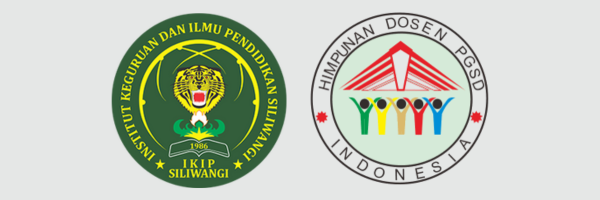Profile of Learning Environmental Literacy in Elementary School
DOI:
https://doi.org/10.22460/pej.v6i2.3139Abstract
Environmental literacy play a crucial role in instilling awareness in children about the importance of protecting the environment. The aim of this study was to describe the learning profile that has an impact on environmental literacy of elementary school students. This research used descriptive qualitative research. The sources of data in this study are 4 elementary schools in Subang Regency from 4 different sub-districts. The data collected was data regarding the profile of students' environmental literacy learning in the Elementary School by focusing on the profile of environmental knowledge, attitudes, and environmental behavior based on environmental literacy measurements. Data collection techniques were carried out by triangulation (combined) through interview and survey techniques. The instruments used in this research were interview guidelines and questionnaires/questionnaires. The data analysis technique was carried out through the stages of data reduction, data presentation, and drawing conclusions. This research showed that: 1) Environmental knowledge profiles in school local content have been well applied in the curriculum which can be seen in the conditioning of the learning environment that blends with nature, and 2) The profile of environmental attitudes and behavior in learning has been well integrated at every grade level, as evidenced by the collaboration between students in protecting the environment. This study recommends educators to focus on environmental literacy to renew their understanding of the importance of protecting the environment and forming social awareness of the surrounding environment. A suggestion for further research is to investigate this trend among public or private schools in several regions of Indonesia.
References
Agsari, KS, Rahady, MK, Wahyudi. (2018). Development of Ecoculture to Improve Environmental Literacy in Elementary School. 3rd National Seminar on Educational Innovation, 1(2), 217-222. https://doi.org/10.20961/shes.v1i2.26858
Andriani, EN, Hartati, T., & Kurniawan, E. (2017). Analysis of Student Text Books From Ecoliteracy Perspective in Indonesia. Adved 2017: 3Rd International Conference on Advances in Education and Social Science, October, 208–214.
Anggraini, W., Karyanto, P., Sarwanto, & Prihantomo. (2019). School and Teachers' Role to Empowerment of Environmental Literacy in Prominent Middle School Based on Adiwiyata Program. Journal of Physics: Conference Series. https://doi.org/10.1088/1742-6596/1233/1/012084
Arweck, E., & Nesbitt, E. (2007). Spirituality in education: Promoting children's spiritual development through values. Journal of Contemporary Religion. https://doi.org/10.1080/13537900701637452
Boafo, YA, Saito, O., Kato, S., Kamiyama, C., Takeuchi, K., & Nakahara, M. (2016). The role of traditional ecological knowledge in ecosystem services management: the case of four rural communities in Northern Ghana. International Journal of Biodiversity Science, Ecosystem Services and Management. https://doi.org/10.1080/21513732.2015.1124454
Choi, K., Lee, H., Shin, N., Kim, SW, & Krajcik, J. (2011). Re-conceptualization of scientific literacy in South Korea for the 21st century. Journal of Research in Science Teaching. https://doi.org/10.1002/tea.20424
Horton, P., & Horton, BP (2019). Re-defining Sustainability: Living in Harmony with Life on Earth. In One Earth. https://doi.org/10.1016/j.oneear.2019.08.019
Karimzadegan, H., & Meiboudia, H. (2012). Exploration of Environmental Literacy in Science Education Curriculum in Primary Schools in Iran. Procedia - Social and Behavioral Sciences. https://doi.org/10.1016/j.sbspro.2012.05.131
Klucevsek, K. (2017). The intersection of information and science literacy. Communications in Information Literacy. https://doi.org/10.15760/comminfolit.2017.11.2.7
Köse, S., Savran Gencer, A., Gezer, K., Erol, GH, & Bilen, K. (2011). Investigation of Undergraduate Students' Environmental Attitudes. International Electronic Journal of Environmental Education, 1(2), 85–96.
Kusumaningrum, D. (2018). ENVIRONMENTAL LITERATURE IN 2013 CURRICULUM AND SCIENCE LEARNING IN SD. Indonesian Journal of Natural Science Education (IJNSE). https://doi.org/10.31002/nse.v1i2.255
Maesaroh, S., Bahagia, K. (2021). Strategies to Grow Environmental Literacy in Students. Journal of Basicedu, 5(4), 2156–2163.
McBeth, W., & Volk, T. (2009). The national environmental literacy project: A baseline study of middle grade students in the United States. Journal of Environmental Education. https://doi.org/10.1080/00958960903210031
Meilinda, H., Prayitno, BA, & Karyanto, P. (2017). Student's Environmental Literacy Profile Of Adiwiyata Green School In Surakarta, Indonesia. Journal of Education and Learning (EduLearn). https://doi.org/10.11591/edulearn.v11i3.6433
Miles, MB, & Huberman, AM (1994). Qualitative Data Analysis: An Expanded Sourcebook (R. Holland (ed.); 2nd ed.). SAGE Publications.
Muthukrishnan, R. (2019). Using Picture Books to Enhance Ecoliteracy of First-Grade Students. The International Journal of Early Childhood Environmental Education.
Nadiroh, N., Zulfa, V., & Yuliani, S. (2021). Learning transformation of the 21st century curriculum for prospective teacher in term of eco-literacy. IOP Conference Series: Earth and Environmental Science. https://doi.org/10.1088/1755-1315/802/1/012009
Pandya, SP (2017). Spirituality and values education in elementary school: Understanding views of teachers. Children and Schools. https://doi.org/10.1093/cs/cdw042
Patrisiana, P., Dike, D., & Wibowo, DC (2020). IMPLEMENTATION OF
ENVIRONMENTAL LITERACY IN SD NEGERI 10 KERAPA SEPAN, KAYAN HILIR DISTRICT, SINTANG REGENCY. WEEK JOURNAL: Citizenship Education Journal. https://doi.org/10.31932/jpk.v5i2.939
Pilgrim, S., Smith, D., & Pretty, J. (2007). A cross-regional assessment of the factors affecting ecoliteracy: Implications for policy and practice. Ecological Applications. https://doi.org/10.1890/06-1358.1
Rigolon, A. (2012). A greener future: The active role of place in enhancing ecoliteracy in children. Journal of Architectural and Planning Research.
Salimi, M., Dardiri, A., & Sujarwo, S. (2021). The profile of students' eco-literacy at nature primary school. Cypriot Journal of Educational Sciences. https://doi.org/10.18844/cjes.v16i4.5999
Seda Koc, E., & Ontas, T. (2020). A comparative analysis of the 4th- And 5th-grade social studies curriculum according to the revised bloom's taxonomy. Cypriot Journal of Educational Sciences. https://doi.org/10.18844/cjes.v15i2.4799
Suryanda, A., Ryansyah, A., Studi, P., Biology, P., & Jakarta, UN (2019). The Relationship Between Ecoliteracy And Willingness To Pay Biology Students To Bring School Lunch Correlation Between Ecoliteracy and Willingness To Pay Of. Biology Didactics: Journal of Biological Education Research.
Tamara, RM (2016). The Role of the Social Environment on the Establishment of Cianjur Regency. Journal of Geography Education.
Wardani, DS, Kelana, JB, & Jojo, ZMM (2021). Communication Skills Profile of Elementary Teacher Education Students in STEM-based Natural Science Online Learning. Basic Education Profession, 8(2), 98–108. https://doi.org/10.23917/ppd.v8i2.13848
Wardani, DS, Wulandari, MA, Nurfurqon, FF, & Kurniawati, D. (2021). STEM-INTEGRATED PROJECT-BASED LEARNING (PJBL) MODEL AND LECTURE WITH EXPERIMENTS LEARNING MODEL: WHAT IS THE SCIENTIFIC LITERACY SKILLS OF ELEMENTARY TEACHER EDUCATION STUDENTS IN THESE LEARNING MODELS? Al-Bidayah: Journal of Islamic Basic Education. https://doi.org/10.14421/al-bidayah.v13i1.634
Yulianti, V., & Kusumaningrum, D. (2021). ANALYSIS OF ENVIRONMENTAL LITERACY SKILLS OF SD STUDENTS IN THE TUREN DISTRICT FOR THE 2019/2020 ACADEMIC YEAR. Primary Education Journals (Journal Ke-SD-An). https://doi.org/10.33379/primed.v1i1.694
Yusuf, F. (2021). ENVIRONMENTAL LITERACY PROFILE OF PROSPECTIVE IPA TEACHER STUDENTS. Quantum: Journal of Science Education Innovation. https://doi.org/10.20527/quantum.v12i1.10098












